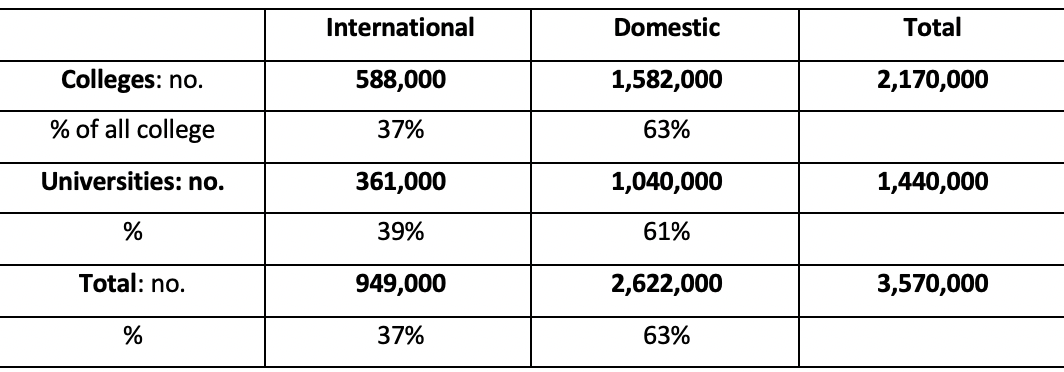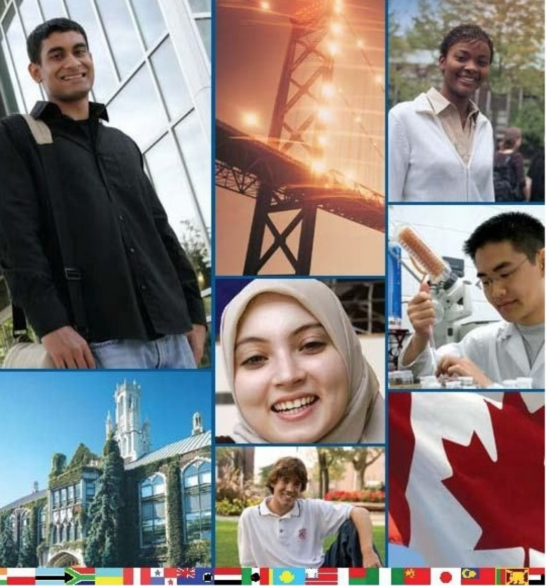What am I claiming?
This post has been brewing for some time, and has been prompted by the recent announcement that the Federal government is re-instating the limit of a maximum of 20 hours paid employment for international students.
I have been increasingly concerned that Canada’s current policies regarding international students are corrupting its post-secondary education system. This is not an attack on international students: on the contrary. My concern is that in a majority of cases international students and in particular their families are being defrauded, while at the same time not only are institutions increasingly acting unethically, but also provincial governments are using the fees from international students to avoid their obligations towards the funding of public post-secondary education.
Canada is in essence exploiting people from poorer countries to subsidize Canada’s own needs – which meets my definition of colonialism.
The case for international students
There is a very good case for Canada to encourage international students. When done properly, it increases the diversity of Canadian institutions, and provides opportunities in higher education for international students that often do not exist in their own country. It can lead to Canadian citizenship for those that succeed in their programs, and boosts the qualifications of Canadian immigrants. Those who choose not to stay will return home with good quality qualifications that will add value in their own country. Above all, hosting international students can lead to greater understanding and networking between nations.
However, that is the ideal, and one that actually existed about 15-20 years ago. Students had to be qualified, visas were restricted to those students who met standard university or college entrance qualifications, and above all once admitted students received the same quality of education as domestic students. However, none of these essential conditions now applies for the majority of current international students in Canada.
What happened?
Immigration, Refugees and Citizenship Canada (IRCC), an arm of the Federal government of Canada, forecasts that the number of international students will reach 949,000 this year and just over a million next year (Hornstein, 2023). The number is projected to rise to 1.1 million in 2025, 1.28 million in 2026 and 1.4 million in 2027. This is part of a deliberate federal government policy to boost Canada’s population from its current 39 million to possibly 100 million by the end of this century.
Almost two-thirds (62%) of international students in 2022 went to community colleges, and the remainder (38%) went to universities. The total number of students in Canadian colleges in 2022 was around 2.17 million, and the total number of universities in 2022 was 1.44 million (Universities Canada, 2023).

So international students constituted almost 40% of all post-secondary students in Canada in 2023. However, for demographic reasons, domestic student numbers are not expected to rise significantly over the next few years, so international students are likely to constitute almost half of all Canadian post-secondary students by 2027.
However, the Federal government, which in Canada has no constitutional responsibility for higher education – that is the responsibility of each individual province – is by default determining the composition of the Canadian student higher education system. It does not ask – nor seem to care – whether half or even more of students attending Canadian universities and colleges should be foreign, which will be the case in five years’ time. That is the responsibility of the provincial governments, and by devolution, the institutions themselves. So why are they not raising this issue with the Federal government?
It’s the money, stupid!
Institutions and even more so provinces see international students primarily as a cash cow to be milked as much as possible. For instance, in Ontario, a Canadian student will pay roughly an average of $8,000 a year in tuition costs for a university undergraduate degree. On the other hand, international students will pay an average of $36,100 per year for an undergraduate degree (Statistics Canada, 2022), an obscene mark-up of 450%.
From 2008 to 2021, the Ontario provincial government reduced university Nominal Operating Grants from $8,514 to $8,350 per student (for students from Ontario). However, inflation rose by 20 percent. The provincial government also mandated a 10 percent tuition fee reduction in 2019 and froze tuition fees in subsequent years (again, for Ontario students – Harrison, 2023).
The universities then are clearly being expected to make up these cuts in revenue from other sources, the primary one being international student fees. In Ontario, international student fees accounted for 68 per cent of tuition fee revenues in 2020/21, totalling $1.7 billion. That exceeds provincial funding provided to the public colleges in the province. .
Ontario is perhaps the most extreme example of subsidizing its post-secondary system from international fees, but other provinces are not far behind.
The consequences
There are several really bad consequences of these policies.
-
Lack of educational quality
More so in the college than in the university system, institutions have started to contract out the teaching of international students to private organizations. For instance, in Ontario, 11 public colleges in the hinterland of Ontario have contracted with private companies in the Toronto area to provide courses for international students, often in office buildings. North Bay-based Canadore College’s private partner had 8.8 times the number of international students as the college itself; at Northern College in Timmins, Ont., the ratio was 8.6 (CBC, 2022).
The teaching in these contracted out classes is not done by regular or even sessional instructors from the public college, but by instructors hired by the private company. However, the qualification is given in the name of the public college.
The long-term consequence of this is that employers will become increasingly suspicious of the quality of international students who graduate in this way. More importantly, students and more so their parents who are paying these fees are being defrauded. They are not getting the quality of education that they think they are paying for.
2. Unscrupulous recruiters
In the home countries of international students (mainly India, China and the Philippines) unscrupulous local agents are (a) making false claims about what is needed to get into a Canadian post-secondary institution (b) making false claims about how this will help students gain Canadian citizenship (c) charging high fees to the families of those attempting to become international students. The Canadian international student policies are resulting in significant fraud in recruitment.
3. Ripping off the families of international students
The families of international students are often making huge sacrifices to cover not only the tuition fees but also the cost of living in Canada for their students. Such sacrifices may be justified if the students are getting a high quality education but in many cases this is not the case.
4. Overloading Canadian infrastructure
The huge increase in international students has not been accompanied by investment in the infrastructure needed to support such students. Students need accommodation above all, and the influx of large numbers of international students has exacerbated an already dire shortage of housing in Canada. Some of the money generated by international fees should be directed at increasing accommodation for students.
5. Unacceptable stress for foreign students
Most international students need to work to pay their way through university or college in Canada. The fees themselves are excessive but on top of that, like Canadian students, the cost of living is a major challenge, especially rent and food. Many international students carry a huge guilt or obligation on their backs to meet the expectations and sacrifices that their families have made to send them to Canada.
Imagine then their feelings when they realise they are not being offered what they thought they were getting, as is so often happening now.
6. Corrupting/privatizing the Canadian higher education system
Perhaps the issue that most concerns me though is the impact international student immigration policy is having on Canadian higher education itself. In particular, provincial governments are using international students to avoid a fundamental question: how should post-secondary education be funded, and in particular, what should Canadian citizens pay for it, and how?
What many provincial governments (but Ontario in particular) are doing are using international students to subsidize and ultimately privatise Canadian post-secondary education.
In a market, money drives decision-making. If the source of that money is from international students we are at the mercy of foreign government policy, as we saw in the spat between the Indian and Canadian government over an extra-judicial killing, or between China and Canada about the arrest of a Chinese national.
Rethink how we fund post-secondary education in Canada
More importantly, we are avoiding the hard question of what a Canadian degree or diploma is worth to Canadian citizens, and how it should be paid for by Canadians. Instead of focusing on value in terms of what a degree or diploma provides, and making sure that its value is worth the price paid, either through taxes or direct tuition fees paid by Canadian citizens, governments in Canada are focused on how to manage international students so they can best subsidize the public system.
This is morally and ethically wrong, and probably financially foolish too in the long run. This colonialist approach to international students needs to stop, both for their sake and for ours.
References
CBC (2022) The Fifth Estate: International students enticed to Canada on dubious promises of jobs and immigration Toronto: October 21
Harrison, A. (2023) Ensuring Financial Sustainability for Ontario’s Post-Secondary Sector: Toronto: Government of Ontario
Hornstein, J. (2023) Canada’s international student population continues to soar Montreal: CIC News










 Dr. Tony Bates is the author of eleven books in the field of online learning and distance education. He has provided consulting services specializing in training in the planning and management of online learning and distance education, working with over 40 organizations in 25 countries. Tony is a Research Associate with Contact North | Contact Nord, Ontario’s Distance Education & Training Network.
Dr. Tony Bates is the author of eleven books in the field of online learning and distance education. He has provided consulting services specializing in training in the planning and management of online learning and distance education, working with over 40 organizations in 25 countries. Tony is a Research Associate with Contact North | Contact Nord, Ontario’s Distance Education & Training Network.

